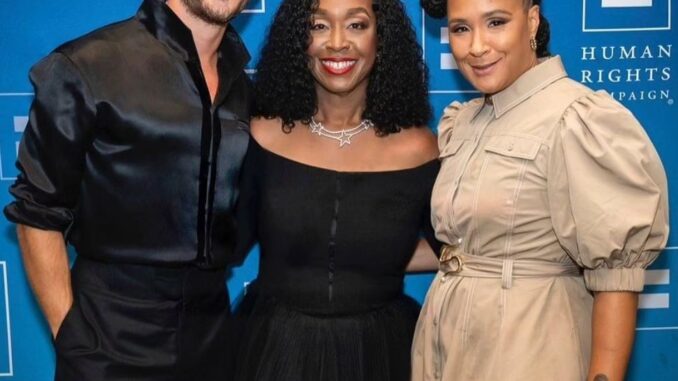
Introduction
In the world of period dramas, historical accuracy and representation often come into play, but Queen Charlotte, a spinoff from the hit Netflix series Bridgerton, takes a bold and refreshing step forward. The show not only delves into the life of Queen Charlotte but also shines a spotlight on the powerful portrayal of Black women within the royal court—a rare sight in historical narratives.
As one of the most talked-about shows of recent times, Queen Charlotte has become a beacon of inclusive representation. This new wave of diversity challenges traditional portrayals of race in royal settings, with the cast and creators praising the show’s inclusive portrayal of Black women. In this article, we will explore how Queen Charlotte highlights these narratives and why this shift is vital for the entertainment industry.
What Makes Queen Charlotte Stand Out in Terms of Representation?
Queen Charlotte isn’t just another historical drama; it’s a powerful narrative shift. The show reimagines history, where Queen Charlotte, the real-life wife of King George III, is depicted as a woman of African descent. This twist on historical accuracy has sparked conversations across the globe about the significance of representation for Black women in stories that have often overlooked them.

The decision to portray Queen Charlotte as a Black woman sends a strong message of inclusion. But what makes the portrayal even more powerful is how the characters are developed, not just in terms of race but as complex, multi-dimensional figures who shape history.
The Importance of Black Representation in Historical Dramas
For many years, Black women have been underrepresented in major historical dramas, particularly those set in European royal courts. Historically, we rarely see Black women in powerful or influential roles. Queen Charlotte challenges this norm and offers a fresh perspective on how we can approach storytelling in a more inclusive way.
Shifting the Historical Narrative
By taking a creative license to reframe the history of Queen Charlotte, Bridgerton creator Shonda Rhimes and her team provide a unique lens through which Black women are no longer merely sidelined in historical depictions but are the focal points of the story. This bold decision to alter history brings much-needed visibility and celebrates the contributions of Black women throughout time.
The Role of Queen Charlotte and the Cast’s Contribution
In Queen Charlotte, the character of Queen Charlotte is played by Golda Rosheuvel, who beautifully brings the character to life. Her portrayal of the royal figure is regal, compassionate, and complex, reflecting the nuances of a Black woman navigating the challenges of the British court.
Golda Rosheuvel’s Impactful Performance
Rosheuvel’s performance as Queen Charlotte is more than just an acting role—it’s a symbol of empowerment. She brings dignity, vulnerability, and strength to the role of a woman whose influence went beyond the palace walls. Rosheuvel has spoken passionately about how important it is for Black women to see themselves represented in spaces where they have historically been absent.
Corey Mylchreest: Bringing King George III to Life
Opposite Rosheuvel is Corey Mylchreest, who plays King George III. His portrayal adds to the drama, showing a nuanced relationship where power dynamics and personal struggles are explored. However, it’s Charlotte’s character that takes center stage, emphasizing her power and presence as the queen.
Supporting Cast: Empowering Black Women Across the Story
Beyond Queen Charlotte, the supporting cast members also play pivotal roles in presenting an inclusive portrayal of Black women in the royal court. Characters like Lady Danbury, portrayed by Adjoa Andoh, embody strength, wisdom, and influence.
Adjoa Andoh’s Powerful Role as Lady Danbury
Adjoa Andoh’s Lady Danbury is not just a figure of nobility—she’s a trailblazer, showcasing what it means to be a Black woman in a world that tries to limit her. Andoh’s portrayal speaks volumes about resilience and power, and her role in Queen Charlotte highlights how Black women were not only present in historical courts but also wielded significant influence.
The Cultural Impact: How Queen Charlotte Is Changing Perspectives
Representation is more than just a buzzword—it’s about making lasting cultural shifts. Queen Charlotte does more than just tell a good story. It’s paving the way for other historical dramas to explore Black narratives in rich and meaningful ways.
Representation Beyond the Screen
The cultural impact of this show is huge. Queen Charlotte opens up conversations about the erasure of Black women from historical contexts and reminds audiences that history is vast and diverse. By showing Black women in powerful positions—whether in the royal court, in love, or leading their families—the show opens the door for more inclusive storytelling.
Setting a New Standard for Historical Dramas
Other period dramas will undoubtedly be influenced by Queen Charlotte. As viewers demand more inclusive representation, we’re seeing a shift in how stories are being told, from historical accuracy to the ways in which race is explored in powerful narratives. This could mark a transformative time in how future productions approach inclusivity, giving Black women more space in the royal and historical worlds of entertainment.
Addressing the Conversation on Representation in Hollywood
It’s no secret that Hollywood has long struggled with issues of diversity. Queen Charlotte is part of a broader trend of pushing back against traditional Hollywood narratives and casting more diverse actors in iconic roles. For many, the show represents an acknowledgment of the importance of giving Black women visibility in every genre, including period pieces.
Conversations Around Diversity and Inclusivity
Actors like Rosheuvel, Andoh, and others have spoken openly about the significance of their roles and the conversations sparked by Queen Charlotte. Their success not only challenges Hollywood norms but also creates more opportunities for young Black women who dream of seeing themselves in roles traditionally reserved for white women.
The Fan Reaction: Why Black Women Are Celebrating Queen Charlotte
For many viewers, especially Black women, Queen Charlotte offers an unprecedented moment of joy and validation. Seeing a Black queen in a historical drama isn’t just empowering—it’s also a reminder that Black women have always been a part of history, even if they weren’t always acknowledged.
Social Media Buzz and Fan Support
The buzz around Queen Charlotte on social media has been overwhelming, with fans applauding the show for its inclusive approach. Many Black women have expressed their excitement over the portrayal of Charlotte as a woman of African descent, as well as the powerful portrayal of Black women in the royal court. The reactions on Twitter, Instagram, and other platforms have highlighted the significance of seeing Black women take center stage in a genre that has historically excluded them.
What’s Next for Queen Charlotte’s Legacy?
As Queen Charlotte continues to grow in popularity, it’s clear that the show will have a lasting impact on the way Black women are portrayed in historical dramas. This groundbreaking shift in storytelling is just the beginning.
Future Projects and Impact on Hollywood
With more stories focused on diverse characters and inclusive narratives, we can expect to see a future where the faces of Black women in historical roles are more common. Queen Charlotte is setting a precedent for Hollywood, and its legacy is sure to influence future projects in the Bridgerton franchise and beyond.
Conclusion
Queen Charlotte has successfully redefined how we view Black women in historical narratives, presenting a more inclusive portrayal of power, love, and resilience. Through stellar performances and groundbreaking storytelling, the show has set a new standard for inclusivity in period dramas. The impact of Queen Charlotte goes far beyond entertainment—it is a cultural shift that will inspire more diverse representations in the years to come.
As we look to the future, we can only hope that Queen Charlotte becomes the norm, not the exception, when it comes to portraying Black women in historical contexts. The story of Queen Charlotte and the powerful women around her will undoubtedly leave an indelible mark on Hollywood and on the hearts of viewers worldwide.
Frequently Asked Questions
1. How is Queen Charlotte portrayed in the show? Queen Charlotte is portrayed as a powerful Black woman navigating the complexities of royal life, challenging traditional historical narratives with a modern, inclusive twist.
2. What makes Queen Charlotte a groundbreaking show? Queen Charlotte is groundbreaking because it reimagines historical narratives, featuring Black women in powerful roles in a royal court that traditionally excluded them from such positions.
3. Who plays Queen Charlotte in the Netflix series? Golda Rosheuvel plays Queen Charlotte in the Netflix series, bringing depth, elegance, and strength to the role.
4. Why is the representation of Black women important in historical dramas? Representation of Black women in historical dramas is important because it challenges stereotypes, provides visibility, and showcases the diverse contributions of Black women throughout history.
5. What impact has Queen Charlotte had on Hollywood? Queen Charlotte has sparked important conversations about race, diversity, and representation in Hollywood, encouraging more inclusive storytelling in future period dramas.